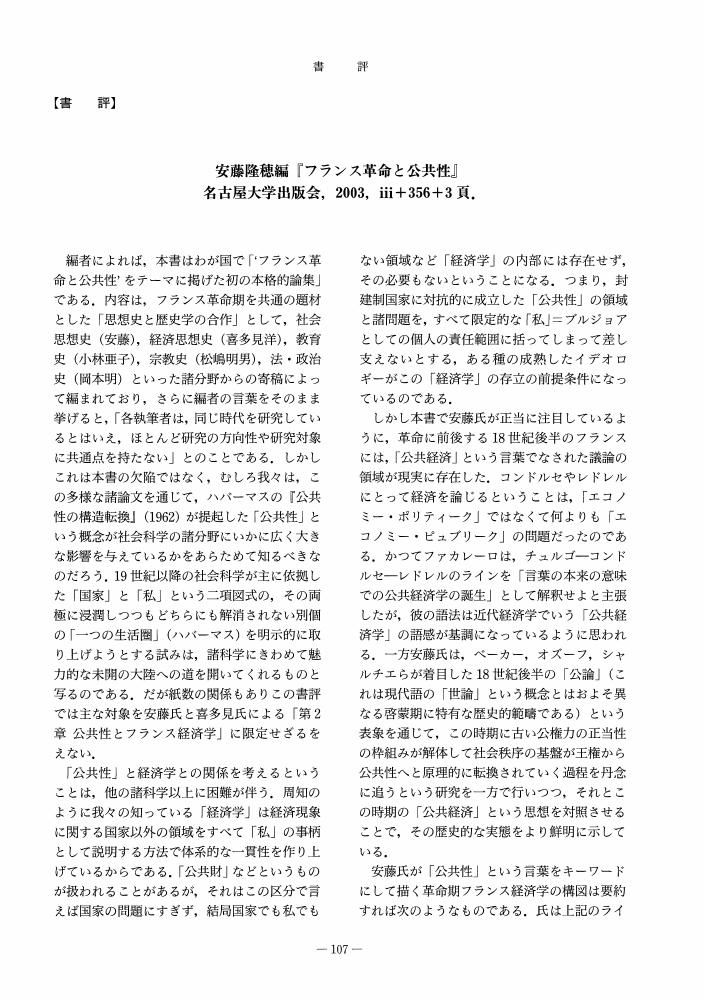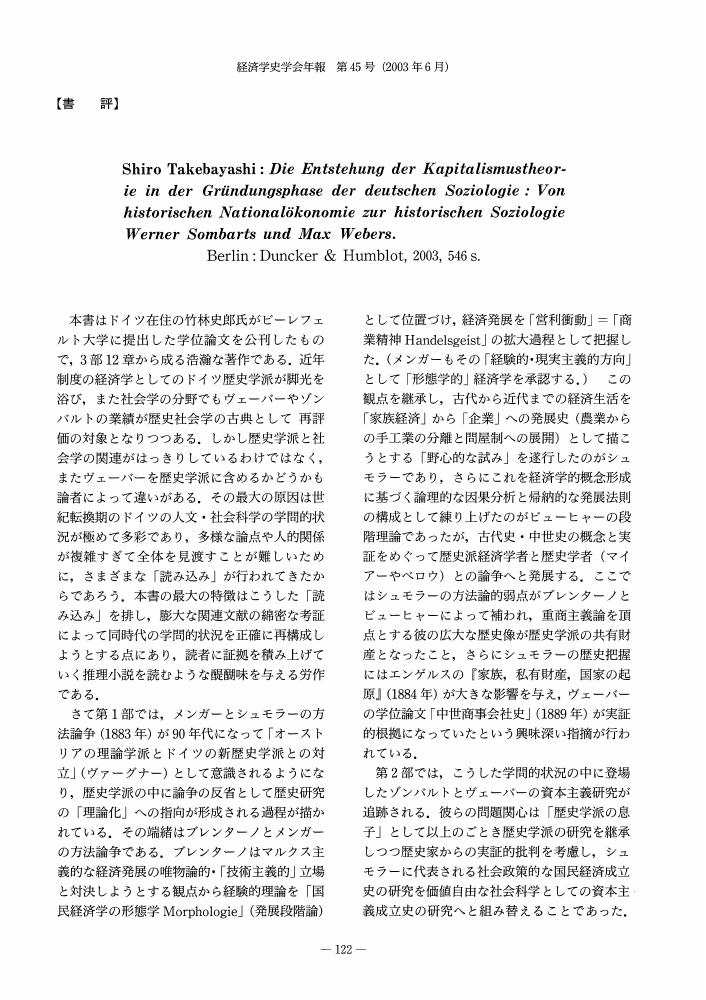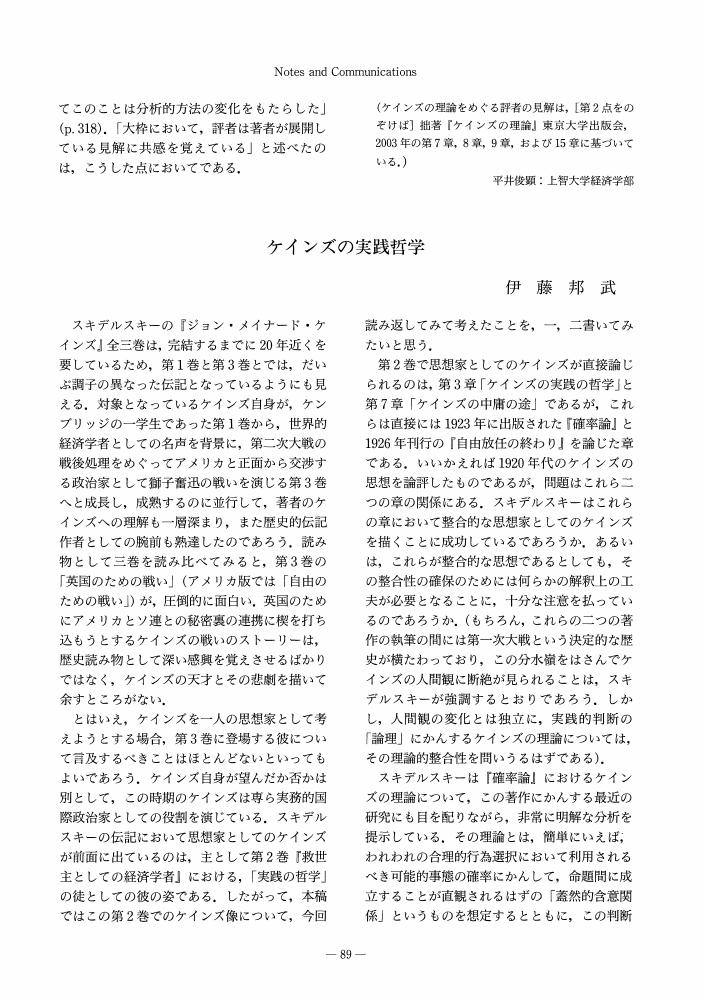- 著者
- 山崎 好裕
- 出版者
- The Japanese Society for the History of Economic Thought
- 雑誌
- 経済学史学会年報 (ISSN:04534786)
- 巻号頁・発行日
- vol.45, no.45, pp.131-133, 2004 (Released:2010-08-05)
- 著者
- 川俣 雅弘
- 出版者
- The Japanese Society for the History of Economic Thought
- 雑誌
- 経済学史学会年報 (ISSN:04534786)
- 巻号頁・発行日
- vol.45, no.45, pp.134-135, 2004 (Released:2010-08-05)
- 著者
- Bertram Schefold
- 出版者
- The Japanese Society for the History of Economic Thought
- 雑誌
- 経済学史学会年報 (ISSN:04534786)
- 巻号頁・発行日
- vol.46, no.46, pp.1-16, 2004 (Released:2010-08-05)
- 参考文献数
- 55
1 0 0 0 OA カール・レンナーの民族的自治論
- 著者
- 太田 仁樹
- 出版者
- The Japanese Society for the History of Economic Thought
- 雑誌
- 経済学史学会年報 (ISSN:04534786)
- 巻号頁・発行日
- vol.46, no.46, pp.17-30, 2004 (Released:2010-08-05)
- 参考文献数
- 59
The Austrian national theory is understood with the names of Karl Renner and Otto Bauer. While many people realized that the existence of a nation-state cannot remove the occurence of national confrontation, much attention was lavished on their conception of personal national autonomy. However, the basis on which their concept is graunded is not fully made clear. This paper examines “the right of self-determination of nations” of Karl Renner, who advocated the policy of personal national autonomy, and intends to clarify the theoretical basis of his conception of personal national autonomy.Renner understood the nation as a personal language-culture community, and understood the state as a territorial community. Modern nationalism aims at the construction of a nation-state in which race and state correspond. This nationalism intends to unify these two social groups which are based on heterogeneous principles. Modern national problems emerge from here. In a multi-ethnic state like the ex-Austrian-Empire, the nationalists intended to build nation-states with substantial sovereignty inside of a state. Renner understood that the complicated strife between nations in Austria was thus characterized.The solution Renner raised converted Austria into a federation in which the wheels of national autonomous government and territorial autonomous government (‘twodimensional federation’) are turning. The national autonomous government is constituted by the personal principle. Free nationality-declaration of each person, registration to the nation ledger, formation of the national autonomous government as a subordinate agency of the federal government, and execution of national administration of education, welfare, and culture, these must be introduced. Renner's conception of national autonomy is based on the view of a nation as a personal community, and the view of freedom and autonomy=self-determination to be included in and secured by an upper organization or power.Renner's conception was contradictory to the fact of separation and independence of many nations after the First World War. But, the establishment of a nation-state did not bring the solution of national problems. The necessity for reexamination of Renner's conception is increasing today.
1 0 0 0 OA ジョーゼフ・ラウントリーのガーデン・ビレッジ構想
- 著者
- 岡村 東洋光
- 出版者
- The Japanese Society for the History of Economic Thought
- 雑誌
- 経済学史学会年報 (ISSN:04534786)
- 巻号頁・発行日
- vol.46, no.46, pp.31-47, 2004 (Released:2010-08-05)
- 参考文献数
- 63
The purpose of this paper is to investigate Joseph Rowntree's philanthropy, and in particular, the Garden Village he founded, and then to clarify the importance of it as the model of a community that was like a neighbourhood unit, and as the inspiration behind the creation of the Welfare State in Britain.In the late 19th century, two successful entrepreneurs, T. Salt and E. Akroyd, had founded the villages of Saltaire and Akroydon, respectively. They were located very close to the big mills that employed their workers. These villages somewhat improved the living conditions of their employees. In London, some funding was invested in improving housing conditions and received a 5per cent commercial return. Subsequently, the setting up of the Peabody Trust in 1862 led the way for others to follow, and the endowment of trusts by philanthropic individuals developed through the Guinness Trust which was started in 1889, the Sutton Housing Trust, founded in 1900, and the Samuel Lewis Trust, foundes in 1906.But the great estate William Sutton left gave rise to fundamental social and political issues, in particular the role of charity in the provision of housing and relief of poverty. The size of his bequest raised fears that the trust could monopolise housing for the poor, disrupting local housing markets and undermining the rateable base of local authority income. Finally, the High Court of Chancery retained the direction of the Sutton Trust's affairs, exercising control over the initial funds and all surpluses generated.Around the same time, in Birmingham, the Cadbury family moved their factory from the city centre to the countryside, to a site later renamed Bournville. While the factory was under construction, some attractive cottages were erected nearby. An experimental housing estate followed a few years later, which in 1900 became the Bournville Village Trust, a product of the age that created the Garden Cities' movement. In a sense, it was the philanthropic ideal that created this community.In 1904, Joseph Rowntree, using approximately half his fortune, set up three separate Trusts. One of those was the JR Village Trust, which was concerned with living conditions and in particular with the houses at New Earswick, known as Garden Village. Through this Trust, an effort was made to provide houses that were artistic in appearance, sanitary, and thoroughly well-built yet within the means of working men earning about 25s. a week (i. e., the lowest incomegroup). In short, this project aimed to improve the housing of Rowntree's workers. Rowntree simultaneously intended to create a community that functioned like a neighbourhood unit. And so, for the inhabitants, the new village would mean something more than bricks and mortar.Through the founding Garden Village and the providing of houses for his workers, the middle-class Rowntree philanthropically pursued social reform for the public good as he saw it. We can say that the Garden Village still lives on, and continues to play the role for which Rowntree intended it, of providing welfare for the poor.
1 0 0 0 OA 田島慶吾『アダム・スミスの制度主義経済学』ミネルヴァ書房, 2003, xii+380頁
- 著者
- 渡辺 恵一
- 出版者
- 経済学史学会
- 雑誌
- 経済学史学会年報 (ISSN:04534786)
- 巻号頁・発行日
- vol.45, no.45, pp.101-103, 2004 (Released:2010-08-05)
- 著者
- 橋本 比登志
- 出版者
- 経済学史学会
- 雑誌
- 経済学史学会年報 (ISSN:04534786)
- 巻号頁・発行日
- vol.45, no.45, pp.104-106, 2004 (Released:2010-08-05)
1 0 0 0 OA 安藤隆穂編『フランス革命と公共性』名古屋大学出版会, 2003, iii+356+3頁
- 著者
- 岩本 吉弘
- 出版者
- 経済学史学会
- 雑誌
- 経済学史学会年報 (ISSN:04534786)
- 巻号頁・発行日
- vol.45, no.45, pp.107-109, 2004 (Released:2010-08-05)
- 著者
- 手塚 真
- 出版者
- 経済学史学会
- 雑誌
- 経済学史学会年報 (ISSN:04534786)
- 巻号頁・発行日
- vol.45, no.45, pp.110-112, 2004 (Released:2010-08-05)
1 0 0 0 OA 三田剛史『甦る河上肇-近代中国の知の源泉』藤原書店, 2003, 476頁
- 著者
- 八木 紀一郎
- 出版者
- 経済学史学会
- 雑誌
- 経済学史学会年報 (ISSN:04534786)
- 巻号頁・発行日
- vol.45, no.45, pp.113-114, 2004 (Released:2010-08-05)
- 著者
- 只腰 親和
- 出版者
- The Japanese Society for the History of Economic Thought
- 雑誌
- 経済学史学会年報 (ISSN:04534786)
- 巻号頁・発行日
- vol.45, no.45, pp.115-116, 2004 (Released:2010-08-05)
- 著者
- 高 哲男
- 出版者
- The Japanese Society for the History of Economic Thought
- 雑誌
- 経済学史学会年報 (ISSN:04534786)
- 巻号頁・発行日
- vol.45, no.45, pp.120-121, 2004 (Released:2010-08-05)
- 著者
- 田村 信一
- 出版者
- The Japanese Society for the History of Economic Thought
- 雑誌
- 経済学史学会年報 (ISSN:04534786)
- 巻号頁・発行日
- vol.45, no.45, pp.122-124, 2004 (Released:2010-08-05)
1 0 0 0 OA J. M. クラークの社会経済学のヴィジョン
- 著者
- 佐藤 方宣
- 出版者
- The Japanese Society for the History of Economic Thought
- 雑誌
- 経済学史学会年報 (ISSN:04534786)
- 巻号頁・発行日
- vol.45, no.45, pp.40-54, 2004 (Released:2010-08-05)
- 参考文献数
- 40
In the late 1910s, John Maurice Clark insisted that traditional economics (value economics and price economics) was becoming irrelevant to the problems of “an era of social readjustment, ” advocating the need for another type of economic theory which he called “social economics.” This conception of social economics had a place in the basis of his economic thought, and core ideas of his works in the interwar periods, such as Studies in the Economic of Overhead Cost (1923) or Social Control of Business (1926), were corollaries of the fundamentals of his social economics.In this paper, we scrutinize the original plan of John Maurice Clark's social economics logically and historically, and clarify its nature and relevant historical contexts, especially its relationship with the institutionalism movements and the implication of Clark's discussions with Anderson, Jr. on the meaning of social value in economic theory.First, we consider why Clark advocated that social economics must become a centerpiece of economics. This was derived from his relative view of the nature of economic theory, which, he thought, had to reflect dynamic social and economic changes. This is why price economics which was based on static premises and whose materials were selected with reference to a logical “closed system” were irrelevant to problems in an era of reconstruction after the World War I. He claimed that it must become a subordinate part of economics.Secondly, we examine the framework of Clark's social economics which he described as “non-Euclidean.” Clarifying the premises of traditional economics, he presented relevant premises of social economics, such as a concept of wealth as “inappropriables, ” a need for qualitative standards of economic activity, a universal nature of overhead cost, a problem of mechanization, and so on. He proposed that these aspects of social economics reflected the context of that time, such as an appearance of Big Business Systems, and the experience of the World War I.Finally, we examine the backgrounds of Clark's advocacy of social economics, placing it in the context of the American economic thought of the time. We clarified its connection with the emergence of institutionalism movements led by Hamilton and other young economists, and with the controversy regarding the concept of social value. On the one hand, Hamilton's critical judgment for traditional economics and claim for institutional economics took the same approach as Clark's social economics. Therefore they had become representatives of institutionalists in the interwar period. On the other hand, by examining Clark's discussions with Anderson Jr., we recognize that they shared same context of the discussion of social value, started from John Bates Clark's Philosophy of Wealth (1885). This seems to be one of the main sources of J. M. Clark's emphasis on the need for a social value standard which implied a valuation not based on actual market prices.
1 0 0 0 OA 日本経済思想史: 政策学から経済学へ
- 著者
- 藤井 隆至
- 出版者
- The Japanese Society for the History of Economic Thought
- 雑誌
- 経済学史学会年報 (ISSN:04534786)
- 巻号頁・発行日
- vol.45, no.45, pp.55-65, 2004 (Released:2010-08-05)
- 参考文献数
- 108
The third report in the present series, this paper offers an analysis of important recent studies (from 1980 to the present) of Japanese economic policy and thought in the 1910's and 20's.The economy of Japan following WWI can be described particularly in terms of its emphases on scientific development and industrial production. However, this progress in industrial development led to the appearance of a widened gap between rich and poor, and one of the major issues concerning the economic thought of the time was how to improve the lot of the poorer levels of society, including workers, farmers and city dwellers.Research in the field of economics during the 1910's and 20's had as one of its focal points the attempt to alleviate this exaggerated difference between the haves and havenots. The economics of the Association for the Study of Social Policy attempted to reduce the gap between rich and poor through the implementation at a national level of specific social policies. The ineffectiveness of these policies, however, resulted in a lack of faith in the ability of the Association to do anything about the situation in a concrete way.The crumbling of the economic policies associated with this Association for the Study of Social Policy allowed for the appearance new approaches, such as the Neoclassical economics of Tokuzo Fukuda and the Marxist economics of Hajime Kawakami.The present study introduces the work of Kanae Iida and Kanji Kobayashi. Seeking an approach to the study of economics based on firmly-grounded economic theories, this paper presents and comments on the work of Kanae Iida, Mikio Nishioka, Takutoshi Inoue, Tamotsu Nishizawa, Hideomi Tanaka, who themselves each analyzed the ideas of Tokuzo Fukuda. It also introduces and comments on the work of Shiro Sugihara, who investigated the thought of Hajime Kawakami.This paper also presents the research of Kunio Yanagita, and comments on the ideas of Yoshiteru Iwamoto and Takashi Fujii, with a particular emphasis on the idea that a suitable ethical policy is critical to the success of any given economic policy.Finally, this paper reports a decline, dating from the 1980's to the present day, in the number of studies of particular economic questions and problems, accompanied by a corresponding increase in research on historical individuals. However, it suggests that the work of Aiko Ikeo and others seems to be slowly bringing about a return to a question-centered focus.
- 著者
- 平井 俊顕
- 出版者
- 経済学史学会
- 雑誌
- 経済学史学会年報 (ISSN:04534786)
- 巻号頁・発行日
- vol.45, no.45, pp.86-89, 2004 (Released:2010-08-05)
1 0 0 0 OA ケインズの実践哲学
- 著者
- 伊藤 邦武
- 出版者
- 経済学史学会
- 雑誌
- 経済学史学会年報 (ISSN:04534786)
- 巻号頁・発行日
- vol.45, no.45, pp.89-91, 2004 (Released:2010-08-05)
1 0 0 0 OA スキデルスキーのケインズ
- 著者
- 小峯 敦
- 出版者
- 経済学史学会
- 雑誌
- 経済学史学会年報 (ISSN:04534786)
- 巻号頁・発行日
- vol.45, no.45, pp.91-94, 2004 (Released:2010-08-05)
1 0 0 0 OA 西部忠氏の書評に答える
- 著者
- 若田部 昌澄
- 出版者
- 経済学史学会
- 雑誌
- 経済学史学会年報 (ISSN:04534786)
- 巻号頁・発行日
- vol.45, no.45, pp.95-97, 2004 (Released:2010-08-05)
- 参考文献数
- 9
1 0 0 0 OA 稲村勳『「国富論」体系再考』御茶の水書房, 2003, vii+281+23頁
- 著者
- 野沢 敏治
- 出版者
- 経済学史学会
- 雑誌
- 経済学史学会年報 (ISSN:04534786)
- 巻号頁・発行日
- vol.45, no.45, pp.98-100, 2004 (Released:2010-08-05)















